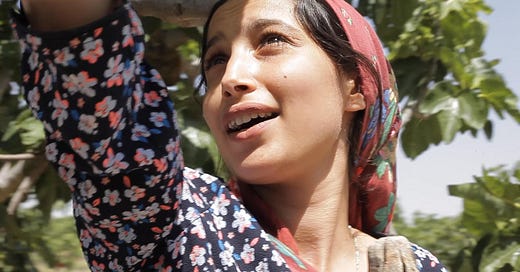It’s been a few days since the start of the film festival, and I have found it tough to keep pace with these written reviews. Who would’ve thought that writing intently about film and a full-time job would be an immense juggling act? The second film I saw in the theatres was Erige Sehiri’s Under The Fig Trees (2022). Other films I’ve also already seen and hope to cover here: Cristian Mungiu’s R.M.N (2022) and Saeed Roustaee Leila’s Brothers (2022). All of them were new-to-me directors. Exciting!
The festival’s sub-programme Domain: To Those Who Remain, spotlights the films of the South West Africa and North Asia (SWANA) region. From what I understand, even the act of calling the region SWANA, is one of rebellion against Western hegemonic geographical delineations. It’s a rare opportunity to catch these films, and I knew I wanted to watch at least one of them. When I saw that Under The Fig Trees was about young people working and flirting, the Rohmer fan in my brain started tingling, hoping to find similar pleasures in a new context. I can say my suspicions were not unfounded and that, spoiler alert, I enjoyed it. I hope you enjoy the following review as much as I did the film.
Under the Fig Trees (2022)
It is the middle of the work day, and you have been toiling under the sun picking figs. The foreman is being a lout and he’s not paying enough, but at least it is finally lunchtime. You finally get to sit on the grass with your friends Fidé, Sana, Melek, and Mariem. You gossip with each other and flirt with the boys. Melek makes eyes at Abdou, everyone knows they were romantic once. Sana has prepared a meal for her crush Firas, but you don’t think she should waste her time. Fidé is off on another rant while Meriam lounges in her sun hat, without in a care in the world. Gaith giggles in the corner; he’s just happy to be included. You wish you could just sit for the rest of the afternoon, but soon Leila will come chide you to get back to work. Soon the work day will end, and so will your teenage years. The sun will age you and the wrinkles will set in. Will you still be here in your later years like Leila and Hneya? No, you don’t want to think about that. You’re young! First, you must find love.
These are the feelings you will have as Erige Sehiri’s confident narrative feature debut Under the Fig Trees (2022) lulls you in. Over its unhurried runtime you will get to know these young women, and cultivate a kinship with them through the screen. They enjoy their flirtations and go through small heartbreaks. There are no major crises, except for a few broken fig tree branches and bruised figs. The film’s pace is easy-going, cutting across parallel conversations as the women trade conversation partners and reveal shared histories.
The tone and approach is intimate, where Sehiri and cinematographer Frida Marzouk favour the close-up in almost all their coverage of the film’s characters. While the performances are genuine and lived-in across the ensemble, the tyranny of the close-up does feel limiting. There were many instances where I hoped for more physical distance from the characters, or maybe a wider lens choice, to let the conversations breathe better and so we can feel their physical presence as they weave between the fig trees. The body is an excellent communicator, and an overemphasis on facial and vocal expressions leaves out so many possible subtle non-verbal cues.
Even so, the characters are wonderfully realised and the core quartet of Fidé, Sana, Melek, and Mariem feel distinct with their own perspectives on relationships, marriage, and sometimes something as mundane as food. Sana loves spaghetti.
That lunch scene is an early highlight, allowing the group to come together in a communal activity where we can slowly begin to sketch the battlelines intersecting between the young women and the young men who have their eyes on them, and they on them. While the atmosphere is generally light and low-stakes, there are scenes that unsettle the genial tone. Between men who actually just want to get laid, and women laser-focused on the supposed security of marriage, the flirtations are not always friendly but can be calculated, sometimes aggressive.
The older women who we consistently check in on diligently packing figs at first feel like they are included to round out the workforce as a bit of local world building. However, they are revealed to be the master stroke of the film’s script construction (written by Ghalya Lacroix, Erige Sehiri, Peggy Hamann). The young women are openly optimistic for their futures, whether in love or work, whereas the older women have settled: forlorn for old flames, or resigned to the repetitiousness of their employment. There is no inherent meaning to this juxtaposition, but it feels like a reminder that these older women, too, were young once, and that the youth, with their sights on their futures, could possibly already be living alongside it. Against stark realities, their teenage sense of abandon and romantic aspirations shine brighter, and the film celebrates them for it. Sometimes, girls just want to have fun.





